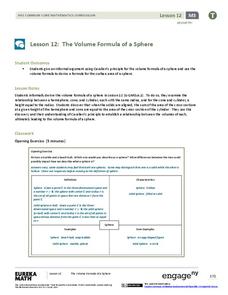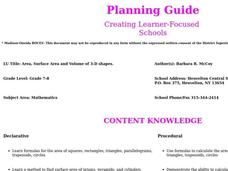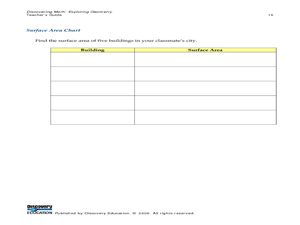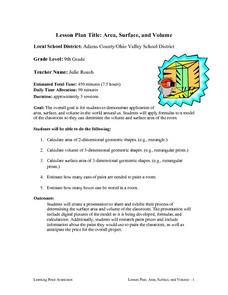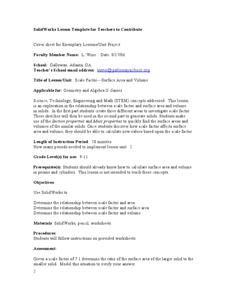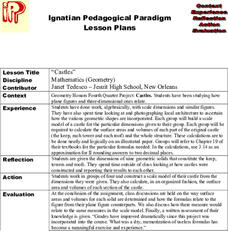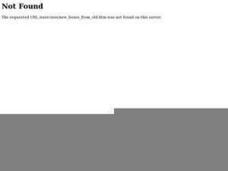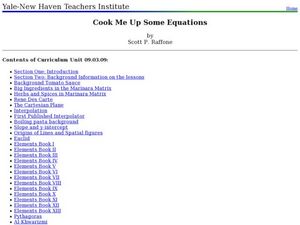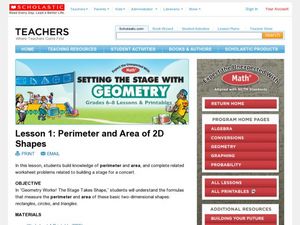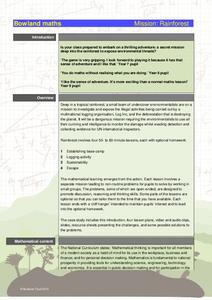Digital Lesson
Cereal Box Surface Area
How much math can your learners pour out of a cereal box? Your middle schoolers will explore their favorite cereal and calculate the surface area, volume, and weight ratios and log this information on the provided worksheet. They get to...
EngageNY
The Volume Formula of a Sphere
What is the relationship between a hemisphere, a cone, and a cylinder? Using Cavalieri's Principle, the class determines that the sum of the volume of a hemisphere and a cone with the same radius and height equals the volume of a...
Curated OER
Area, Surface Area and Volume of 3-D Shapes
Math whizzes examine the relationship between area and volume and the relationship between a 3-D shape and its surface area. Following discussion and practice, pupils participate in a project in which they design packaging for a new...
Discovery Education
Discovering Math: Exploring Geometry
Apply geometric properties and formulae for surface area and volume by constructing a three-dimensional model of a city. Learners use similar and congruent figures and transformations to create a city of at least 10 buildings. They trade...
Curated OER
Area, Surface, and Volume
Ninth graders demonstrate application of area, surface, and volume. They apply formulas to a model of the classroom so they can determine the volume and surface area of the classroom.
Curated OER
Scale Factor- Surface Area and Volume
Students calculate the surface area and volume of shapes. For this geometry lesson, students create different scales and calculate the volume and area for each shape. They compare and contrast between the different scales and shapes.
Curated OER
Attack of the Raging River
Students explore mass and volume. In this mass and volume lesson, students pretend to be on a hike and have lost their way. Students must cross a river get back on track. Students must use mass, volume, surface area, density, property...
Teach Engineering
Discovering Relationships Between Side Length and Area
Consider the relationship between side length and area as an input-output function. Scholars create input-output tables for the area of squares to determine an equation in the first installment of a three-part unit. Ditto for the area of...
Illustrative Mathematics
Christo’s Building
Hook your charges on how to solve a real-world art problem with mathematics by showing works of Christo. You can find eye-catching images on the Christo and Jeanne Claude webpage. Here, math learners help Jean Claude and Christo prepare...
Curated OER
Castles
Students create a scale model to a castle using the dimensions they were given. They calculate the surface areas and volumes of each section of their castle.
Curated OER
TE Activity: The Boxes Go Mobile
Students create a mobile of boxes and cubes that they made in a previous lesson that can be accessed from this page. They design the mobile using method that an engineer would use to balance the items based on surface areas and volumes.
Curated OER
Exploring Number and Operation in Secondary Mathematics
Young geometers need a clear understanding of perimeter, volume, and area. This lesson provides a worksheet to help small groups of learners to calculate various measurements of objects and choose the proper units for measurement. It...
Curated OER
New Boxes From Old
Students find the volume and surface area of a rectangular box (e.g., a cereal box), and then figure out how to convert that box into a new, cubical box having the same volume as the original. As they construct the new, cube-shaped box...
Curated OER
Cook Me Up Some Equations
Learners study a variety of math concepts in the context of cooking up a meal. In this math lesson plan, students calculate surface area and volume. They draw and interpret different types of graphs.
Curated OER
Artistic Angles
Fifth graders explore angles by using protractors. They recognize, describe and determine the surface area and volume of three-dimensional shapes. Students recognize the right angle, acute angle, obtuse angle and vertex. They identify...
Curated OER
Area Explorations
Young scholars explore the concept of area. In this area lesson, students find the area of irregular shapes with right angles. Young scholars break down each irregular shape into multiple regular shapes in order to find the area. ...
Curated OER
Surface Tension and 3D Soap Films
Students are introduced to the concept of surface tension, its dependence on material composition, and how it can produce uniquely shaped surfaces.
Curated OER
Who Wants to Carry a Million?
Students, in groups, determine the volume of a box large enough to hold a million dollars. They calculate the dimensions of a bill and the volume of the money.
Curated OER
Candy Land
In this activity students pretend that they have been hired by a candy manufacturer to design a box for a new product they are beginning to market. The manufacturer has pre-determined the volume of the candy box. It is the students' job...
Curated OER
Perimeter and Area of 2D Shapes
Pupils find the perimeter and area of circles, triangles, and rectangles. In this perimeter and area lesson, the teacher gives students formulas for each shape and measurement and works through examples on the board. While no creative...
Bowland
AstroZoo
Rescue animals in the zoo by applying math concepts. Groups of learners solve three missions involving oxygen, food, and climate control. Each group selects an animal from one of four bio-domes.
Bowland
Mission: Rainforest
Young environmentally conscious mathematicians solve a variety of problems related to the central theme of uncovering illegal logging activities. They determine a base camp based on given constraints, investigate logging activities and...
Curated OER
Traditional American Indian Lodges
Students explore the mathematical properties of traditional American Indian lodges. They examine the effect of increasing sides of a polygon, calculate the surface area of prisms and cylinders, and construct a classroom size pyramid...
Alabama Learning Exchange
Effects of Friction on a Moving Block
Learners investigate how friction affects the movement of a block across surface areas. They test five different kinds of surfaces—smooth surface, wax paper, a paper towel, course, and fine sandpaper. They predict and record the results...



